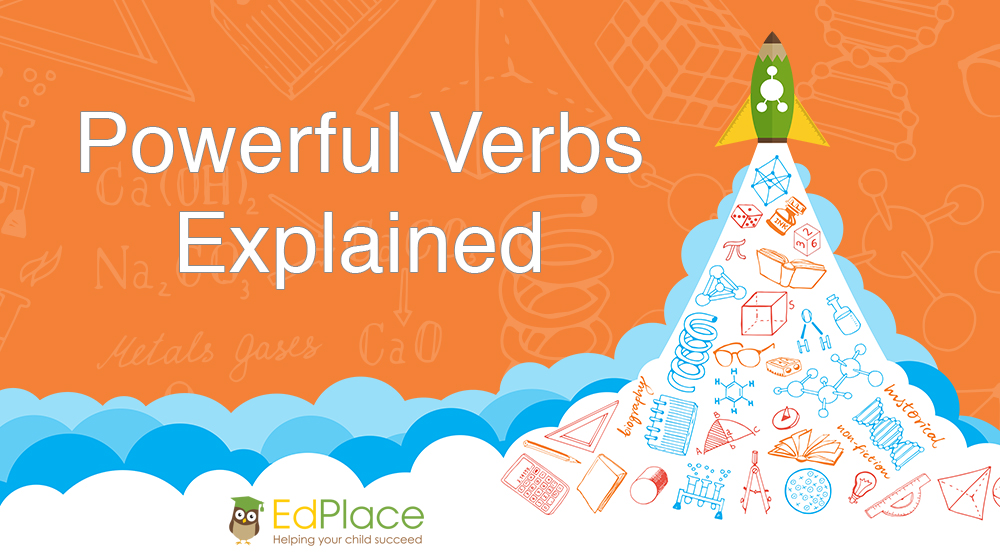What are Powerful Verbs?
Powerful verbs are more descriptive verbs that can really make a huge difference to your writing.
Verbs are, very basically, doing words. They describe an action (run), a mental action (dream) or a state of being (joy).

Powerful verbs are more descriptive verbs that can really make a huge difference to your writing.
Verbs are, very basically, doing words. They describe an action (run), a mental action (dream) or a state of being (joy).

Try our English, maths and science activities for free
Sign up for freeMs Alison, one of EdPlace's English teachers, reveals all:
When writing, we try to communicate our thoughts and ideas to our readers. The more expressive and accurate our choice of language, the more powerful our ability to communicate. Powerful verbs play a really big part here.
Think of all the different words we have for ‘said’ – whispered, groaned, screamed, cried, laughed, mumbled, explained...there are a plethora of examples. If you switch out 'said' and replace it with a more powerful verb instead, your writing instantly transforms, evolving into something more descriptive and varied. This helps your reader interpret how you - or your character - feels; for example, you can change a general conversation into a shouting match.
Here are some more simple examples:
| “Don’t worry,” I said, “It was George who upset her.” | “Don’t worry,” I explained / whispered / stated, “It was George who upset her.” |
| “Give that back to me now!” Said the boy. | “Give that back to me now!” Demanded / asked / pleaded / laughed the boy. |
| “Stop that!” said the irritated teacher. | “Stop that!” Yelled / Screamed / Cried / Stammered the irritated teacher. |
Look carefully at the examples above. We have listed a few different verbs that could be used for each of the above scenarios. Each verb would change the reader’s interpretation of the scene. If you have a range of powerful verbs to choose from, it will really bring your writing to life!
I ran to the park – Past tense
I run to the park / I am running to the park – Present tense
I will run to the park – Future tense
In primary school, children are encouraged to have a bank of powerful verbs to replace the most common verbs they might use.
Here is a list of our top ten most commonly used verbs along with a range of richer and more powerful choices:
| 1 | Said | Screamed, shouted, sobbed, talked, whispered, yawned, hummed |
| 2 | Walked | Strolled, sauntered, trudged, wandered, zoomed, tip-toed, stumbled |
| 3 | Ate | Gobbled, chomped, chewed, gulped, tasted, licked, munched, sucked |
| 4 | Saw | Glanced, admired, envied, glimpsed, spied, examined, peeked |
| 5 | Looked | Explored, thought, discussed, examined, researched, practised |
| 6 | Moved | Bounced, danced, hopped, jumped, ran, skipped, dashed, crawled |
| 7 | Cried | Bawled, blubbered, sobbed, trembled, sighed, wept, winced |
| 8 | Laughed | Giggled, smiled, smirked, admired, grinned, guffawed |
| 9 | Found | Located, unearthed, identified, collected, gathered |
| 10 | Ran | Jogged, pelted, raced, stumbled, staggered, swayed, galloped |
Of course, we're here to help and support you on your learning journey, and we have a number of worksheets aimed specifically at understanding and using verbs. We’ve listed some below to get you started, but there are many more available on our EdPlace.com
Year 3 – Use verb tenses consistently.
Year 4 – Identify Powerful Verbs in Sentences
Year 4 – Using Powerful Verbs.
Year 4 – Using Suffixes to make Verbs 1, 2 and 3.
Year 4 – Understand Tenses - Verb awareness
Year 5 – Understanding modal Verbs
Year 5 – Use modal verbs and adverbs to show degrees of possibility.
The BBC also has a range of resources and games linked to verbs - here are a few:
http://www.bbc.co.uk/guides/zpxhdxs
http://www.bbc.co.uk/guides/zsx2b82
http://www.bbc.co.uk/guides/z3dbg82
http://www.bbc.co.uk/guides/zps4pbk

WRITTEN BY: Ms Alison – ENGLISH TEACHER
I’m sure you’ve heard things like this before: ‘The journey home was a nightmare!’ or ‘You’ve got a ...
Calculating a percentage reduction is a vital skill that can save you money and help you make inform...
The square root of a number is a value that, when multiplied by itself, gives the original number. I...
Imagine trying to describe your favourite toy or pet without using words that tell you more about th...



